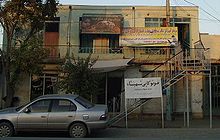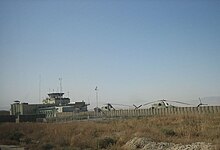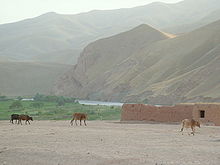Kunduz
|
کندوز Kunduz |
||
|---|---|---|
|
|
||
| Coordinates | 36 ° 44 ′ N , 68 ° 52 ′ E | |
| Basic data | ||
| Country | Afghanistan | |
| Kunduz | ||
| District | Kunduz | |
| ISO 3166-2 | AF-KDZ | |
| height | 397 m | |
| resident | 356,536 (calculation 2019) | |
| politics | ||
| Mayor | Mohammad Farhad | |
Kunduz (also Kunduz , Qhunduz ; Pashto / Dari :کندوز Kunduz , DMG Kundūz , tooقندوز Qundūz ) is the capital of the Kunduz province of the same name. It is located in the northeast of Afghanistan in the valley of the Kunduz tributary to the Amudarja near the Tajik border, around 250 km north of Kabul . Around 350,000 people lived in the city in 2019. Kunduz lies at an altitude of 397 m.
The region is very fertile and unusually green for Afghanistan. The valley through which the Kunduz River flows is surrounded by high mountains on three sides and indirectly on one side, the foothills of the Hindu Kush . Kunduz has a small airfield, Kunduz Airport .
Kunduz has been mainly inhabited by Pashtuns since the political 'Pashtunization' at the beginning of the 20th century . Besides them, Tajiks and Uzbeks live in the city. Kunduz is the center of the four northeastern provinces of Kunduz, Badachshan , Baghlan and Tachar .
story
The city was once called Drapsaka and was an important place that, among other things, dates back to 330 BC. Was used as an army camp by Alexander the Great during his campaign against Bessus , the self-proclaimed king of the Bactrians . In the time of the Timurids (1370–1507) the city was mentioned with the name Kunduz . This is derived from Persian quhan-diz , "old citadel".
From 1680 the local Qatagan rule became more visible.
Under the governor Shir Khan Nashir (Nasher) the province of Kunduz became the richest province in Afghanistan in the 20th century. The main reason was Naschir's founding of the Spinzar Cotton Company , which still exists in post-war Afghanistan and has resumed production. Mohammad Omar Safi is currently the governor of Kunduz Province.
business
In Kunduz, among other things, cotton , rice , wheat , maize and melons are grown. The latter have a reputation for being the best in the country and are often exported to other provinces including Kabul in adventurously laden trucks and cars. In general, agriculture is on a more pre-industrial level, tractors are rarely seen. The fields are mostly worked with carts of oxen. Kundus is the location of the Afghan German Management College .
climate
Kunduz has a continental climate , and it is usually a few degrees warmer than Kabul. In summer, temperatures can sometimes exceed 50 ° C. Most of the time, however, the thermometer is just above 40 ° C, which is relatively bearable because of the dry air. It can snow in winter.
Afghanistan war
After the fall of the Taliban government in 2001, the OEF military operation began , followed by the international security and support forces (ISAF) in Afghanistan. After expansion of the ISAF mandate to the northern provinces who took over in January 2004 Bundeswehr an American property in the city center, in the end of May 2006, the reconstruction team for the Kunduz province ( English Provincial Reconstruction Team (PRT) ) with the participation of different nations (Belgium, Netherlands, Hungary, Romania, USA), was stationed. Since June 2006, the PRT has been housed near the airport in the German field camp in Kunduz . On October 6, 2013, the field camp and the Kunduz region were transferred to regional security responsibility.
On the morning of September 28, 2015, around 1,000 Taliban fighters penetrated the city center and occupied important government buildings, until evening they managed to bring the entire city under their control ( see also: Battle of Kunduz ). The Afghan security forces withdrew to the airport outside the city. This was the first time that a provincial capital of Afghanistan fell into the hands of the former rulers since the fall of the Taliban in October 2001. Reports from Amnesty International , according to the Taliban committed serious crimes in the shortest possible time and so built with murders of civilians, gang rapes, kidnappings and the use of death squads in a few days, a "reign of terror" in the city. On October 1, 2015, Afghan troops brought part of the city back under state control. According to reports on October 3, 2015, a US air strike also hit a hospital, killing several civilians .
On October 13, 2015, it was announced that the city was back in the hands of the Afghan government.
The last soldiers of the Bundeswehr were withdrawn from Kunduz on November 26, 2020. The Taliban completely recaptured the city on August 8, 2021.
See also
literature
- CE Bosworth: Kunduz. In: The Encyclopaedia of Islam. New Edition . Volume 5, 1986, pp. 388f
Web links
Individual evidence
- ↑ Estimated Population of Afghanistan 2019-20. (PDF) National Statistic and Information Authority, November 18, 2019, accessed March 6, 2020 .
- ↑ Kunduz Airport . Afghanistan Ministry of Transport and Civil Aviation. March 21, 2007. Archived from the original on September 27, 2007.
- ↑ Kunduz Province (PDF) In: Program for Culture & Conflict Studies . Naval Postgraduate School . Archived from the original on October 2, 2012. Retrieved January 12, 2014.
- ↑ 2003 National Geographic Population Map (PDF) In: Thomas Gouttierre, Center For Afghanistan Studies, University of Nebraska at Omaha; Matthew S. Baker, Stratfor . National Geographic Society . 2003. Retrieved June 18, 2017.
- ^ Jürgen Paul : Central Asia . Frankfurt am Main 2012 ( Neue Fischer Weltgeschichte , Volume 10), p. 358
- ↑ http://www.khaama.com/mohammad-omar-safi-appointed-new-governor-of-kunduz-9083
- ↑ Taliban have conquered Kunduz city . In: The world . September 28, 2015. Retrieved September 29, 2015.
- ↑ The Taliban have completely conquered Kunduz . In: Zeit Online . September 28, 2015. Retrieved September 29, 2015.
- ↑ Amnesty International report: Taliban commit serious crimes in Kunduz. Stuttgarter Zeitung, October 1, 2015, accessed on October 4, 2015 .
- ↑ Heavy losses for the Taliban: Afghan special forces recapture Kunduz . October 1, 2015. Accessed October 1, 2015.
- ^ Air strikes in Kunduz: "The US military knew where our hospital is". Spiegel Online, October 3, 2015
- ↑ Air raid in Kunduz Intentional or accidental? Criticism of US attack on clinic . In: Der Tagesspiegel . October 3, 2015. Retrieved October 3, 2015.
- ↑ Two weeks after the invasion: Taliban release Kunduz again. Their invasion of Kunduz had shocked many - now the radical Islamic Taliban are withdrawing from the northern Afghan city by their own account. Nevertheless, their regained strength has put pressure on the government in Kabul. (No longer available online.) In: tagesschau.de. ARD, October 13, 2015, archived from the original on October 20, 2015 ; Retrieved October 20, 2015 .
- ↑ Matthew Rosenberg, Michael D. Shear: In Reversal, Obama Says US Soldiers Will Stay in Afghanistan to 2017. New York Times, October 15, 2015, accessed October 19, 2015 .
- ↑ tagesschau.de: Bundeswehr withdraws the last soldiers from Kunduz. Retrieved November 26, 2020 .
- ↑ Taliban conquer Kunduz . Spiegel.de, August 8, 2021.



